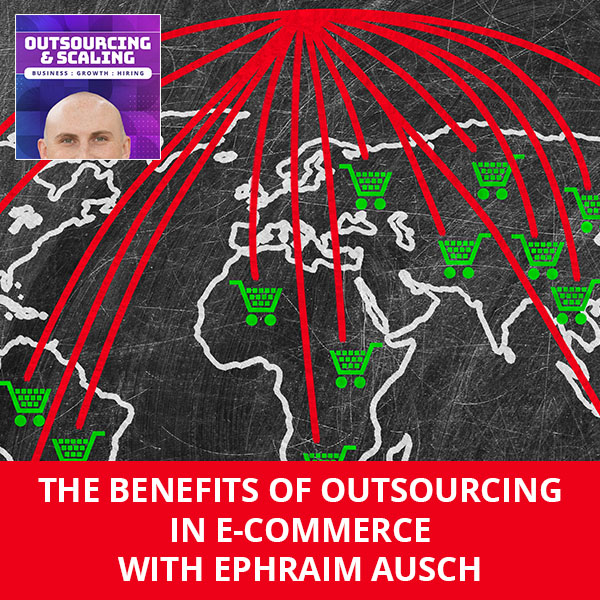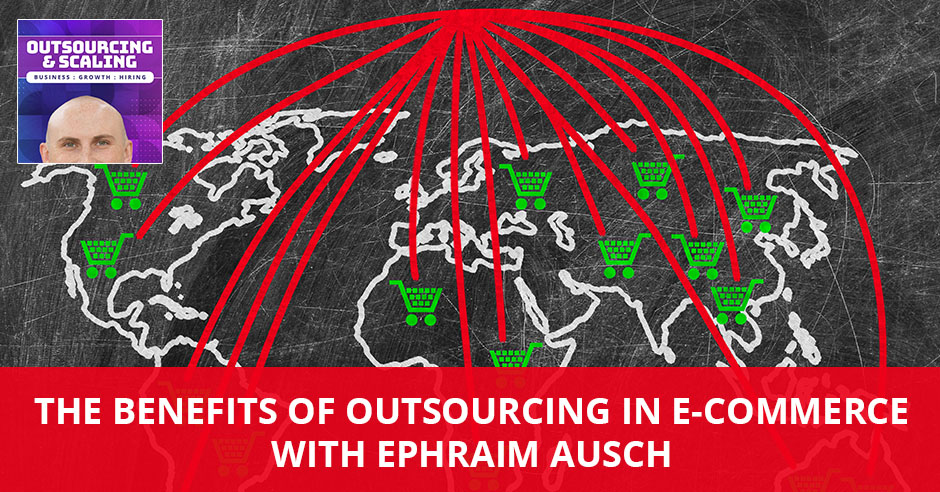


With everything happening online, the eCommerce world has become crowded and competitive. Passionate at helping others succeed in eCommerce, Ephraim Ausch of Tactical Logistics has your back and guides you through the ins and outs of the industry. He shares his rough start in the business until he eventually got the hang of it through coming upon the wonders of outsourcing. Ephraim tells us the benefits of hiring remote, the importance of logistics, and the value in knowing what to outsource. Find out more about what Ephraim has to say in this episode.
—
Listen to the podcast here:
[smart_track_player url=”https://www.podetize.com/statsapi/www.podetize.com/wp-content/uploads/fileuploads/11-5b145ef137b51b3d1af0633e9305c43d/11/2019/dcafd4ea36eea2cf13e373f587ca02d6.mp3″ title=”The Benefits Of Outsourcing In E-commerce With Ephraim Ausch” artist=”Nathan Hirsch” image=”https://freeup.net/wp-content/uploads/2019/04/OAS.png” ]
Download the audio file here.
The Benefits Of Outsourcing In E-commerce With Ephraim Ausch
My guest is Ephraim Ausch. How are you doing?
I’m doing great. How are you?
I am doing great. I am pumped to have you on. I know you have over eight years of experience in eCommerce. You founded your own boutique online and corporate holiday gift shop called the Benevelo Gifts and then outsourced the company to a specialty co-packer. He now directs the sales depot at Tactical Logistic helping sellers outsource all their logistic needs and help them focus on the main core of their business and that is selling their products online. Ephraim’s passion is to help others succeed in eCommerce. We’re going to talk all about that. Let’s take a gigantic step back. What were you as a kid growing up? Were you a straight-A student? Were you a rebel? Did you always know you wanted to be an entrepreneur?
I was not a straight-A student ever. I was always looking for opportunities and definitely, entrepreneurship was something that I was looking for. I never studied college or things like that. I never did well with that. I right away went into working for a company that we started, an Amazon account going back a few years ago. I worked there for two years and I decided to go on my own. I made one Amazon account. I sold for a few years. I realized that I was a very seasonal business. Obviously, gift baskets are a Christmas brand. My overhead was killing me. I started outsourcing my logistics. I hired a VA to save money with all the data entry, all the listings and stuff that I was doing here. I am paying someone to be able to turn a profit. We were profitable for a couple of years. In the last few years, I have so much extra time. I decided to join my father’s company that’s logistics. That’s what I’m doing for the past years. The gift basket company is one season a year. That’s what I focused on. For Christmas, I take care of that. I have a co-packer who does everything for me and that’s how I sell it.
I want to hear more about your story. Eight years is a long time to be in eCommerce. I got into eCommerce in 2009. How did you originally get into eCommerce and what was it like? Walk us through that first business.
The first time I started, I was looking for any job. I want to get into the working field. I got my first job as a custom service representative for a candy company. I started picking up phone calls and helping out people with their online orders. I worked there for two months getting paid $10 an hour doing nothing. I asked the owner, “Is there any potential or is there any opportunity that I could grow? I want to do something good. Picking up phones is great but I want to grow. I don’t feel like I have a growth in that part.” He decided and he said, “A year ago we tried Amazon and it wasn’t doing well. Maybe we can try again.”
We opened up an account. He had around 3,000 different SKUs on his Shopify account. It was Metro or maybe it was a Magento, I don’t remember what shopping cart we used. We had 3,000 SKUs from different candies, nuts and chocolates. I started listing every day. I list 500 products and there were no sales. I was getting frustrated after two months. I’m listing products but not having sales. I started asking, researching, and I thought of looking at the keywords. That’s how I started growing into that. After a year, we did $1 million in sales. Once I started working with keywords, Amazon PPC came out at that same time. That helped out a lot as well. That’s still the good times with PPC. We opened up a campaign, knocked it out and had sales. It was amazing. Those were the years that you didn’t have to focus too much on that.
What was your first hire in your eCommerce business?
My first hire probably was half a year into opening my own. That’s when I worked out of someone’s warehouse. They gave me free space. We started working out there. I did everything on my own. Once we started growing, we had a good Christmas season. I went and I leased the warehouse. I hired my first assistant to help me with listings and stuff like that. That year was a terrible year. I had a very high overhead and that’s when I started realizing I’ve got to do something about it. I started talking to people. Someone told me, “You’ve got to outsource.”
I was like, “How do I outsource? How do I outsource contractors? How do I outsource my company? These are gift baskets. This is customized stuff. It’s not something that I could outsource.” That’s what I thought. Someone told me there are co-packers out there. There are VAs out there. I was completely new to that. Slowly, it took me a year to transition over to a co-packer. They took care of everything, labeling, assembly, everything. The next thing was like, “You could outsource your contractor. You don’t have to pay $15 an hour for a contractor doing the same work. You can pay half the price doing a VA.” I hired a VA at that time and I trained them on how to do things. It did well for a while and I still use one.

What did you learn working with someone in the Philippines or outside the US for the first time? For me, that was a shock when I was interacting, assigning works and communicating.
What I learned from it is in the beginning, I trained them to do things. I was unsure. I was like, “Is she going to know what to do? She’s not next to me. How is that going to work?” I started learning. You could use Slack. You could use messaging. There are many different ways how you could record stuff that you do, your experience and show it to them. A lot of them are knowledgeable within the eCommerce industry. A lot of them did that for a few years. It took me probably 3 to 4 months to get used to that. Once I got used to it, it was amazing. It was a breath of fresh air.
Do you have any bad hiring experiences that you can share on maybe something related to eCommerce?
Definitely, I had someone that I hired and apparently, the resume said that she had experience in what I was looking for. When it came to reality, she didn’t know anything about anything. I tried her for 8 to 9 weeks and every day she came to tell me, “This is great. I did that.” I started looking into what happened and it was not the case. She ended up leaving on her own because she realized that I’m not buying whatever she was telling me. I hired someone else in the office. I used that for a few months and then I’ve got to know about VAs. I changed to VAs and it was a totally different story.
You have two companies now. Can you walk us through the structure of each company? Do you have internal contractors? Do you have VAs, freelancers? Do you have managers?
For my eCommerce company, I have one VA, a co-packer that packs everything. Outside the company, I have someone that they basically get a small commission. They’re in contact with the VA most of the time so I don’t have to focus on that. They focus on social media. We’re building up our Shopify cart to have someone to be able to place orders online themselves. We both share them, but I get a report once a week from my VA to know how everything is going. From there, the other company that I use takes care of everything.
For someone who’s trying to get into eCommerce or they’re trying to grow their eCommerce business, what advice would you give them?
To open up the eCommerce is pretty tough, but if you know what you’re doing and you take advice from experts, how to hire, what to look for when you list products, how to work with PPC, all different aspects that you learn well. You do training on how to do that. You can build a successful company if you have the right product.
Let’s talk about logistics. It’s not a sexy thing to talk about. A lot of entrepreneurs ignore that part of the business. Why is it important? What are some of the mistakes that you see people make?
There are lots of mistakes that people make if you go into a lot of different areas of that. The main mistake is people say, “I have my own warehouse. I have my own people. I don’t need to outsource my logistics.” I explained to them, “Do you know your overhead? What’s your overhead for having all the contractors, getting containers from China, unloading, palletizing, labeling and then prepping them? Do you know what that costs?” They are like, “Whatever.” They don’t know what it costs them per unit. You’re selling on Amazon, you think you’re making 30% or 40% profits, for example. That’s not the case because when you utilize the whole warehousing, you fill up a full warehouse, then you could know what it costs you every single square foot. If you’re not full and you have to hire, to unload containers, that gets costly. You don’t really know your cost. What I say is outsource it to a third-party logistics company that takes care of A to Z.
We do that. There are other companies that do that and you would know your cost exactly on the cents, what it costs you to import a product, label it and get it into Amazon. If it comes with a delay, what it costs you to get your product on time. That’s what I suggest to people is to look at the overhead. If they don’t know it, then crunch numbers with a third party. See if that makes sense for you and make that change. Automatically, you have so much more time in your day to build your company and build your brand. Hire more people, freelancers or VAs to grow your company. Get new products. Get new categories. Having huge warehousing, logistics and importing is a huge headache for a lot of people. They don’t realize it. If they could free up that time and do something else, it can help them out with their business.
Can you give us some estimates of numbers or maybe some things that people should be aware of in that breakdown of what you’re actually paying in fees to Amazon?
That’s a huge factor now, especially with Amazon’s new IPI or Inventory Performance Index. I think that’s effective since July 2018. A lot of people didn’t realize that I’m bringing in a container or ten pounds of goods and they were able to send everything into Amazon. They were like, “I don’t need a warehouse. I don’t need storage. Amazon will take everything from me.” A lot of people don’t realize that if your sell-through is not the greatest, you’re paying a lot of storage. Eventually, Amazon will restrict you from sending a new product.
If you have too much inventory, they will restrict you because your sell-through is not good. A lot of people don’t realize the Q4, how much they get charged per pallet. I’ll give you an example number. We charge $15 a month for example, for pallet storage. Amazon charges for the same pallet roughly around $34 a month all year round. The Q4, they charge around $146 a pound for storage. If you’re not sure if you’re going to sell that and if it is not selling there, make sure it’s not there because you’re paying a lot of more money for Amazon. You might hurt your IPI. If you fall under $350, you’re screwed.
Do you have any examples of customers that were making some very large logistic mistakes that you are able to make some drastic changes in their business and help them?
We have one company that sells blankets and baby products. He had his own warehouse for three years. He closed the warehouse. He says he has the savings of around $30,000 a year now by outsourcing everything to us. That’s huge for him. He says he has now more time. He’s going to work now with new lines. He doesn’t have to be busy with the warehouse workers, with unloading, storing and shipping our products. We do everything for him. He said, “That’s a huge saving.” Technically, it’s $30,000 a month, but if you as a CEO, a CFO or COO executive of the company, your time is a lot of value. You can value yourself at $200-$300 an hour. Some people value that more. If you have to be busy with a lot of this low-end work of warehousing and logistics, that’s not important. It’s important for your business, but it’s not important to you. You could have someone else do it for way cheaper. We value that time that you could accomplish way more.
With outsourcing, you automatically have so much more time in your day to build your company and build your brand.
How do you decide what to keep in-house versus what to outsource or do remote?
I learn as I go with something that I need to do because I’m good at it. Sometimes I’ll keep it to myself, but I think through and I realize, “You don’t have to do that. You could have someone outside to do that.” It’s hard to say an example. For us now with logistics where we still have everything in-house, we still didn’t do the VA’s because my father is the owner. We’re not there yet to decide to outsource the logistics part to VA’s. I’m definitely going to go down that route and probably will help us a lot by outsourcing some parts of our company that we don’t have to do in-house here in New York and we can do it overseas. For the gift basket company, it’s going well. I’m not focused that much on it. It’s one time a year.
Do you have any advice for people running a seasonal business like that?
A seasonal business is very risky. I’ll give you one nugget. The problem with seasonal businesses is that let’s say in the summer, we’re not selling anything. That means your IPI is full because you’re not having sell-through. You have some products on Amazon and you’re not doing well. Your IPI is falling and you might be screwed. You won’t be able to send products in Amazon Q4 when that’s when your season is. If you go to the Inventory Performance Index, on the dashboard, you’ll see an option for restocking inventory. You could change it. If you go on the right side on top, it should say preferences. You click on that. An average Amazon seller does 3 to 4 turns a year. You could change that to do one turn a year. Automatically, if you have a product, let’s say you would sell it over a year, but you won’t sell it in three months, you could change that to 22, 25, 30, 50 until 52 weeks. You could change that around. What will happen is that Amazon will realize, “This guy only sells one turn a year. He doesn’t turn more than one time a year.” Automatically, the IPI score will shut up because you’re good. You’re doing well. You’re selling once a year. That’s a help for seasonal sellers.
Do you have any other tips or advice on hiring and outsourcing of logistics?
There’s a part in logistics that a lot of sellers don’t realize. They import their products and label it, and they send everything right away to Amazon. You can do that in China as well. Most suppliers are more straightforward and they have that option now. You could have it labeled and imported from China directly delivered into Amazon instead of bringing it to your warehouse, paying that extra money and then getting on Amazon. It’s time, money and that helps out a lot.
This has been great. Where can people find out more about you? What are you most excited about for the rest of the year?
My website is TacticalLogistic.com. At the bottom of the website, you could inquire for information. If you sign up there, I’ll get back to you right away within 24 hours. What’s exciting? The tariff is a big deal now. A lot of people have a lot of questions. A lot of people have a lot of anxiety about what’s going to happen? What’s going on? How they could get around things? How they can work things around? Definitely, we have lots of calls and emails. We’re there to help them. If they have any questions, anybody can reach out and I’ll be happy to help them with that.
Thanks so much for coming on. Have a great rest of the day.
Thank you. You too, Nathan. Take care.
Important Links:
About Ephraim Ausch
 Ephraim Ausch has more then 8 Years experience of e-commerce experience. He founded a small boutique online and corporate holiday gift shop called Benevelo Gifts and then outsourced the company to a specialty co-packer.
Ephraim Ausch has more then 8 Years experience of e-commerce experience. He founded a small boutique online and corporate holiday gift shop called Benevelo Gifts and then outsourced the company to a specialty co-packer.
He now directs the sales depot at Tactical Logistics helping sellers outsource all there logistic needs and help them focus on the main core of there business and that is selling there products online. Ephraim’s passion is to help others succeed in the e-commerce world.
